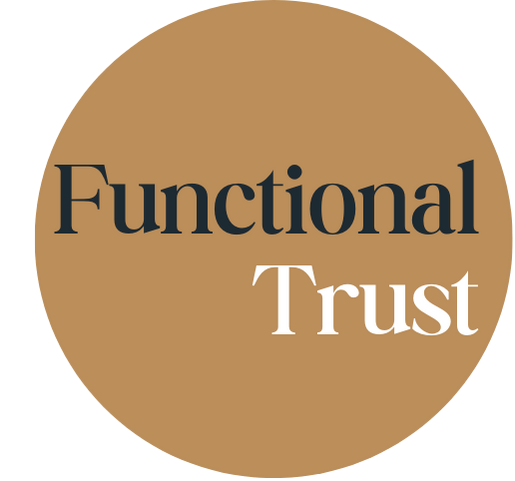Imagine this: You’re planning a trip with friends or family. You’re naturally great at organization, making sure everything is in place, while your travel partner thrives on spontaneity and creative ideas for the trip but tends to ignore the finer details. The result? A clash of archetypes. You’re detail-oriented, while they’re big-picture, and neither of you is particularly strong at handling the logistics of the actual travel plans.
This kind of gap doesn’t just show up in the workplace—it’s everywhere. Whether you’re planning a project with coworkers or organizing a vacation with loved ones, recognizing and managing archetype gaps can help you avoid stress and foster stronger collaboration in all areas of your life.
Understanding Archetype Gaps in Personal and Professional Life
In both work and personal contexts, people naturally gravitate toward their archetypal strengths. Functional Trust, the concept of understanding strengths, neutral zones, and weaknesses, is just as relevant when managing friendships and family dynamics as it is in the office.
For instance, during a trip:
- The Planner: Maybe you’re the one organizing all the details, from booking hotels to managing the itinerary. This falls into your strength archetype—you’re comfortable with planning and structure.
- The Dreamer: Your partner might be full of ideas—where to go, what to see, and which activities to try. They’re great with brainstorming, but they may not follow through on specifics. This is their strength, but they might need support with the practical steps.
- The Neutral Zone: Neither of you enjoys managing the mundane logistics, like packing efficiently or tracking expenses. These are weaknesses for both, and without addressing them, they could create friction during the trip.
Functional Trust helps you navigate these gaps by identifying how you can complement each other in any situation—whether it’s planning a successful trip or managing a high-stakes project at work.
How Archetype Gaps Appear in Personal Life
Let’s use the example of planning a trip:
- Strengths in Action: You’re detail-oriented and love creating a structured plan for the vacation. Your partner may shine in ideation, coming up with creative activities and experiences to make the trip more enjoyable. Together, you have a mix of strong skills.
- Gaps in Operations: However, neither of you enjoys booking flights, handling travel logistics, or managing the budget. This neutral zone, the operations of your trip, could create tension if left unaddressed.
Research on relationship dynamics shows that recognizing and balancing these skill gaps can improve collaboration and reduce conflict in both personal and professional settings . By understanding your archetype and your partner’s, you can better distribute responsibilities to match each person’s strengths.
Leveraging Strengths to Overcome Gaps—At Work and Home
In both work and personal life, you can use the same strategies to complement each other’s strengths. Let’s break it down:
- At work: If you’re the administrator in your team, use your organizational skills to streamline processes. If your colleague is the visionary, let them generate ideas while you ensure smooth execution. Together, you cover the operational gap.
- In your personal life: When planning a trip, as the planner, you handle the details—hotel bookings, daily schedules, and managing the itinerary. Your partner, the creative thinker, focuses on brainstorming fun activities and new experiences. You might still need to collaborate to overcome your shared operational weakness—managing travel details like flights or packing.
Supporting Each Other’s Weaknesses in Both Worlds
Whether it’s at home or at work, supporting each other’s weak spots fosters trust and harmony. Here’s how to approach this collaboration:
- At Work: The administrator can take the lead in organizing team projects, while the creative thinker injects fresh ideas into the mix. Both work together to establish systems for efficiency.
- At Home: In the travel example, if logistics aren’t your strength, leverage each other’s skills where they shine. Maybe one person handles budget tracking while the other handles packing efficiently. Recognize that weaknesses exist and tackle them as a team.
Studies indicate that teams with balanced strengths and roles achieve better results when each person’s contributions are valued and acknowledged . The same principle applies to your personal relationships—when friends or family members feel their strengths are appreciated, collaboration improves.
The Role of Functional Trust at Home
Functional Trust doesn’t just improve work teams—it’s key to strong personal relationships as well. By relying on Competence, Reliability, and Sincerity, you can address gaps that might otherwise lead to frustration. In personal life:
- Competence: Each person brings their strongest skills—whether it’s planning or creativity—into the task at hand.
- Reliability: Follow-through is key. If someone promises to book flights or find a great destination, they need to deliver.
- Sincerity: Be honest about where you need support. If you hate managing budgets, admit it and ask for help, rather than struggling in silence.
These principles of Functional Trust build stronger, more cohesive relationships, whether you’re collaborating on a work project or trying to make your vacation go smoothly.
Building Trust in the Gaps
Bridging archetype gaps—whether in the office or with friends and family—requires openness and communication. When you recognize and acknowledge your strengths and weaknesses, you build trust and create a more balanced dynamic. Here’s how to ensure it works:
- Workplace: Establish clear goals and roles, ensuring everyone understands how their strengths contribute to the team’s success.
- Personal Life: Divide responsibilities for planning a trip or other shared activities based on each person’s strengths, and communicate clearly about expectations.
By embracing your differences, you can strengthen Functional Trust and create a better collaboration, no matter where or how you’re working together.
For more insights on how recognizing archetype gaps strengthens teamwork and relationships, explore Harvard Business Review’s research and this study on relationship dynamics.

